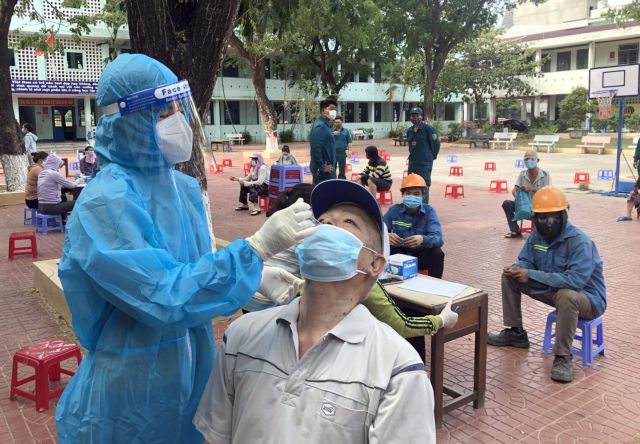 Opinion
Opinion

Trần Đắc Phu, senior advisor to the Việt Nam Public Health Emergency Operations Centre (PHEOC), talks to the Việt Nam Government Portal website about the correct deployment of COVID-19 antigen tests to avoid waste and incorrect outbreak assessments.

|
| Quy Nhơn City of the central province Bình Định carry out testing of its residents. The province in early August started to test 10 per cent of its population for COVID-19 using rapid antigen tests. — VNA/VNS Photo Nguyên Linh |
Trần Đắc Phu, senior advisor to the Việt Nam Public Health Emergency Operations Centre (PHEOC), talks to the Việt Nam Government Portal website about the correct deployment of COVID-19 antigen tests to avoid waste and incorrect outbreak assessments.
Currently, many people have started to buy rapid antigen tests to get COVID-19 results at home, some localities have also used this method to screen for cases in the community. What do you think of its use and effectiveness?
SARS-CoV-2 diagnostics are indeed a critical tool in the strategy of prevention and control, isolation, suppression and containment of outbreaks, as well as treatment. We can only identify virus carriers and clusters of infections via testing.
Currently, there are two methods of testing – screening and confirmation test (real-time RT-PCR).
The confirmatory test aims to determine definitively whether the person is infected with the virus or not. This test is done for someone who has signs or symptoms consistent with COVID-19, or someone who is asymptomatic but has known or suspected recent contact with a confirmed infected case.
Screening aims to find virus carriers in the community.
The rapid antigen tests are used only in screening since its sensitivity and is inferior to RT-PCR diagnostics. All positive samples from antigen tests will need to be tested using RT-PCR to confirm infection.
As its name suggests, the rapid antigen tests deliver results quickly, a test only takes 15 to 30 minutes and does not require complicated medical equipment or a laboratory like RT-PCR. However, these tests only discover the patients with high viral load at the oropharynx (equivalent to RT-PCR tests with cycle threshold below or equal to 25).
With the delta variant of coronavirus spreading fast, most of those infected with this variant have a high viral load at the beginning of the infection (the second to the seventh day), then the antigen tests would have a better chance of capturing these patients. However, after the seventh day to the 14th day or afterwards, the viral load drops significantly so the tests become less reliable or even unable to spot the infected, leading to missing cases in the community. Some research indicates that antigen tests can detect the COVID-19 patients on average 72 per cent of the symptomatic virus carriers, and against the asymptomatic, the rate falls to 58 per cent.
So, rapid antigen tests should only be used in high-risks areas, areas with a high number of infections and those with progressing disease/symptoms (fever or coughing), which means their viral load – if any – would be high enough.
Hospitals should also deploy antigen tests to test for all incoming patients.
The rapid antigen test is a biological product that must be appraised and licensed for circulation by the Ministry of Health. However, currently one can see many offering these on the market. Those types of products in my opinion could be completely fake or of poor quality which could give false results. Negative tests would lead to dropping of caution and failure to comply with preventive measures such as 5K messages [Khẩu trang (facemask) – Khử khuẩn (disinfection) – Khoảng cách (distance) – Không tụ tập (no gathering) –Khai báo y tế (health declaration)], which is dangerous for themselves and for other people.
For the above reasons, when deploying rapid antigen test, it is necessary to test continuously many times, preferably every two days and so it is very expensive.
Many businesses have proposed antigen testing of all their workers, what do you think about this approach?
Only businesses and factories that are located in high risks areas or outbreak-affected areas with many COVID-19 infections should be deploying rapid antigen tests.
Businesses and factories in rather safe areas with very few COVID-19 cases shouldn’t deploy these tests indiscriminately, but should use RT-PCR testing of pooled samples, which would deliver more accurate results.
Decisions regarding deployment of large-scale antigen testing should be the job of the health authorities, or else it would be a waste of money and not particularly effective. I have to repeat that the use of antigen testing on inappropriate groups would lead to dangerously inaccurate outbreak assessment and forecast.
There should be a ‘harmonious’ combination of both types of tests, there should be coordination between epidemiology side and the diagnostics side.
Ideally, all samples must be processed and results must be delivered within 24 hours, or else the value of the test is completely lost. — VNS




